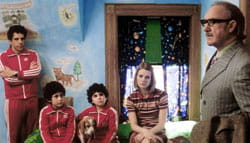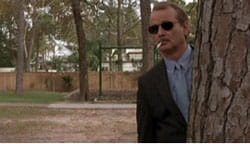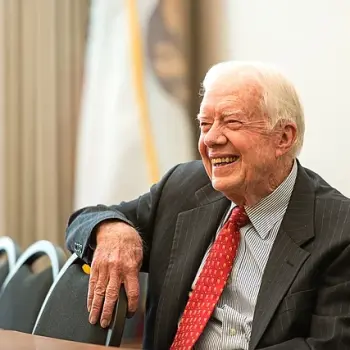When I was a boy of 14, my father was so ignorant I could hardly stand to have the old man around. But when I got to be 21, I was astonished at how much the old man had learned in seven years. ~ Mark Twain
 Wes Anderson is a hard case.
Wes Anderson is a hard case.
As a director whose indebtedness to past cinematic masters is matched only by his influence on current indie filmmakers, Anderson is a crossroads unto himself: often imitated; never duplicated. His films—idiosyncratic, dead-pan, uncomfortably self-aware—are brightly colored, oddly paced slices of life that seemingly exist in an alternate reality: an abstract, non-existent America that is instantly recognizable despite its artificiality. His sly, sarcastic, trademark humor is a peculiar hybrid of knowing winks and unexpected innocence. His hip, urbane stories and emotionally distant characters, combined with an incredibly high ratio of cinematic references per square inch, have made him a favorite with film scholars and cinephiles everywhere. He is the uncrowned (yet unquestioned) king of the musical montage, an auteur whose style rises very nearly to the level of content—and he makes a mean American Express ad.
And yet, intentionally or no, he is a divider, not a uniter.
Anderson's films tend to hide an intriguing (often helpful) message amid a sea of problematic mannerisms. The artificiality of his settings and the peculiarity of his tone are often attributed to insincerity; the callow, modish style—as tangible as any of his characters—to conceit; and the disquieting brokenness of his characters to meanness. Unconscionable behavior and unappealing, fantastically quirky characters litter his films, and it is small wonder that those darker details can often overshadow the insights at the root of his works. While it is impossible to ignore these quirks in his films, it would be a mistake to ignore the message beneath them.
A closer review of the six films in his cinematic portfolio reveals a number of interesting themes—themes which, in the best auteur tradition, crop up repeatedly throughout his filmography. Most of his works feature a conflict between two male leads, taboo love stories, and often an older, mysterious femme fatale that serves as a catalyst for important thematic events. There are, however, a pair of intricately connected topics that serve as the most intriguing—and redemptive—elements to be found in his works: the gradual, essential growth of self-awareness and self-understanding, and the profound importance of fatherhood (as well as the profound damage inflicted by broken father figures in our society).
In Bottle Rocket, Anderson's first feature film, self-understanding plays a key role in the story of three friends who attempt to escape their mundane mid-20s lives by becoming famous and successful thieves. Dignan, their ringleader, lives in a sort of alternate reality—a reality formed by watching too many heist films. When their first several capers prove unsurprisingly successful—how hard can it be to rob one's own mother, or a Barnes & Noble-esque bookstore?—Dignan decides to go on the lam, not so much to avoid capture but because "that's what thieves do."
Unfortunately, their early successes prove to be the high point of their thievery, as reality sets in with alarming suddenness. In spite of their increasingly gloomy predicament, however, Dignan persists in his fantasies. Finally, after a series of bizarre (and slapstick) encounters, the big job they have been planning since the film's opening goes badly wrong, and events take a truly sobering turn. As a result, Dignan realizes the folly of his visions, leaving him a sadder (but wiser) young man.
 Rushmore, Anderson's second film, once again deals with themes of self-understanding—but it also introduces the young director's thoughts on the role of fatherhood and the dangers of its absence. Max Fisher, a bright but troubled teenager, forges an unexpected friendship with the rich but troubled benefactor responsible for funding Rushmore, the prep school he attends. Unfortunately for the two friends, a beautiful, widowed Rushmore professor becomes the object of their competing affections, and in the ensuing chaos, they are both revealed to be increasingly unlikeable. Exasperated by their juvenile behavior, the professor denounces them with the most crushing insult she can imagine: "You're both children."
Rushmore, Anderson's second film, once again deals with themes of self-understanding—but it also introduces the young director's thoughts on the role of fatherhood and the dangers of its absence. Max Fisher, a bright but troubled teenager, forges an unexpected friendship with the rich but troubled benefactor responsible for funding Rushmore, the prep school he attends. Unfortunately for the two friends, a beautiful, widowed Rushmore professor becomes the object of their competing affections, and in the ensuing chaos, they are both revealed to be increasingly unlikeable. Exasperated by their juvenile behavior, the professor denounces them with the most crushing insult she can imagine: "You're both children."
For teenaged Max, this probably comes as no great surprise; but for Herman Bloom, whose two sons attend Rushmore, it is a true revelation. Quite simply, Bloom wants to be a child; he is unwilling (and, at the beginning of the film, unable) to give up his childish ways. But his adulthood and, therefore, his fatherhood are inescapable, and it is only once he realizes that he is living selfishly—a realization that embracing his role as father would have made clear many years before—that he can begin to salvage his badly damaged relationships with others.





